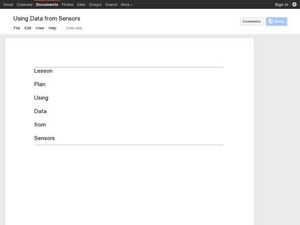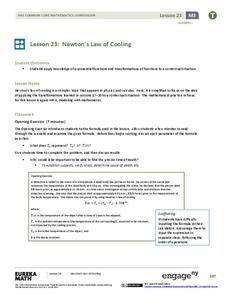Curated OER
Wetlands/Watershed Model
Students make a model that will demonstrate the flow of surface water across the land in Texas and how materials that originate many miles away can end up in the wetland along the coast.
Curated OER
Using Data from Sensors
Beginning with a discussion about using technology to collect data, this resource includes a video about the next Mars rover as an example. Young scientists are taught that filtering is necessary before collected data can be analyzed....
University of Minnesota
Blind Spot
Your eyes each work independently, so how do we only see one image? The quick hands-on experiment encourages young scientists to test their blind spots on each eye individually. After learning where the blind spot is and why it exists,...
Columbus City Schools
You Can’t Sneeze On This Tissue
Take your class' understanding of cells to the next level... or levels! Demonstrate the levels of organization using a variety of engaging methods. The teacher's guide includes the materials you'll need to execute a flower...
Curated OER
The Catcher in the Rye: Vocabulary Self-Collection Strategy
Group members select a word from The Catcher in the Rye they would like the class to know more about. After identifying the context and determining the meaning of the word from the context, they present the word to the entire class,...
Infinite Dreams
Let's Create! Pottery HD
Using a potter’s wheel to make functional art is an experience not common to most people. Provide your learners with a chance to see what pottery making is all about with an app that allows them to create pots, fire them, decorate them,...
Illustrative Mathematics
Delivering the Mail
A mail truck travels the same amount of miles per day. It will be up to your algebra learners to find an equation for this mailman’s truck. One needs a good understanding of rate of change and the initial value for this model. The...
Curated OER
Precalculus: Function Models for Real-Life Situations
Students use calculators and "by hand" techniques to compare models of real-life data situations, determine the best model for a situation, and use their models to make predictions.
Curated OER
Seafloor Block Model
Students construct a 3-D block model of the ocean floor to study fundamental earth processes. This is a preconstructed cut out that allows the students to put it together but then to add their own colors as well. There is an evaluation...
Curated OER
ESL Feeling Multiple Choice Worksheet
In this ESL feelings multiple choice worksheet, 4th graders answer 5 questions about feelings. They look at colorful clip art pictures of feelings before answering questions such as "What do you do when you feel tired?"
Curated OER
Modeling Subtraction of Fractions: Post Test Questions
In this fraction worksheet, students complete a set of short answer and multiple choice questions focusing on subtracting fractions. Students may click on a link to view correct answers.
Curated OER
ESL Things We Like To Do Multiple Choice Worksheet
In this ESL things we like to do multiple choice worksheet, students answer 8 questions based on clip art pictures. They choose the correct answer from 4 that best answers the questions which include, "Can Kermit play tennis?" and "Do...
Curated OER
Fraction Models
Third graders make models of fractions and mixed numbers. Using fraction strips and drawing pictures, 3rd graders develop conceptual understanding of the equivalent forms. Students use the number line to represent and compare...
Curated OER
Model Construction
In this lesson, students explore shapes and forms in architecture. Students understand that the function of architecture influences its form as well as construst a simple architectural model. As an assessment, have students with a...
Curated OER
Making Polite Conversation
Students become familiar with the polite forms of conversation that are used in this country. They role play making requests using polite forms. Students write an appropriate thank you not to a host or hostess. This lesson is intended...
Curated OER
Making a Speech
Fourth graders make a five minute speech on the life of a famous person.
Houghton Mifflin Harcourt
Surprise!: Extra Support Lessons (Theme 2)
Surprise! is the theme of a unit covering such topics as consonants, blending, short vowels sounds, high frequency words, and number words. The unit's lessons also include teachable moments covering story structure, illustrations,...
EngageNY
Percent of a Quantity
Visualize methods of finding percents. Classmates find a percent of a quantity using two methods including a visual model in the 26th lesson in a series of 29. By the end of the lesson, scholars find percents given a part and the whole...
Code.org
Controlling Memory with Variables
Not all variables are created equal. Discover how variables in computer science are different from variables in math class. Scholars learn to work with variables in computer programming by developing a mental model for how variables...
Southern Nevada Regional Professional Development Program
Focus: The Paideia Seminar
Compelling discussions are the result of open-ended, challenging questions. An introduction to Paideia discussions includes explicit directions about how to prepare readers and how to model the kinds of questions they should develop...
Illustrative Mathematics
Tilt of Earth's Axis and the Four Seasons
Geometry meets earth science as high schoolers investigate the cause and features of the four seasons. The effects of Earth's axis tilt features prominently, along with both the rotation of the earth about the axis and its orbit...
EngageNY
Newton’s Law of Cooling
As part of an investigation of transformations of exponential functions, class members use Newton's Law of Cooling as an exponential model to determine temperature based on varying aspects. The resource makes comparisons between...
EngageNY
Conversion Between Celsius and Fahrenheit
Develop a formula based upon numerical computations. The 31st part of a 33-part unit has the class determine the formula to convert a temperature in Celsius to a temperature in Fahrenheit. They do this by making comparisons between the...
Curated OER
Comparing Fractions
Young mathematicians compare two fractions with like denominators and then move to the next level to compare fractions with unlike denominators. They will first try to use mental math to make educated guesses. There are a few guidelines...























